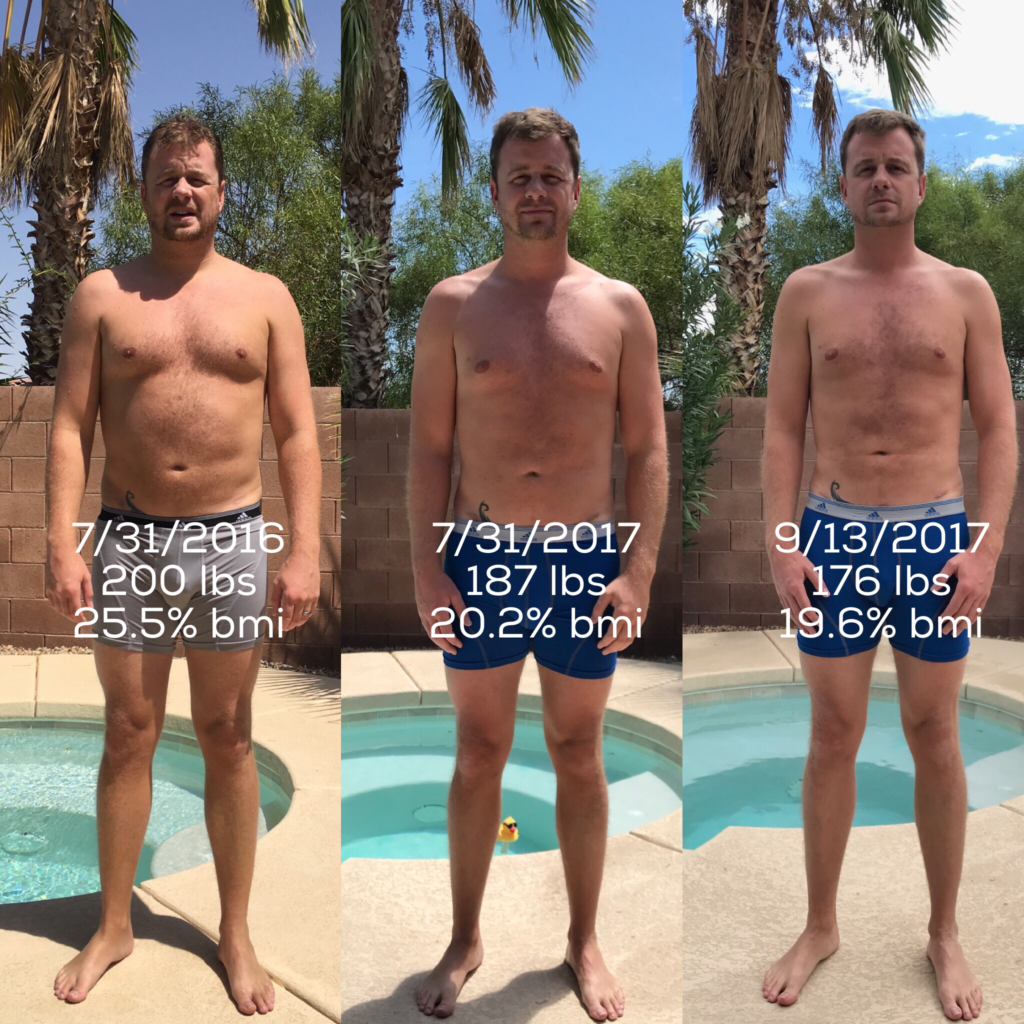13 Sep My 365-Day Challenge (Year One)
On the last day of July 2016, I weighed an even 200 pounds and was packing 25.5% of body fat. The next day, I kicked off a 365-day challenge to improve my health in which I worked out 5-7 days a week and aimed to keep my calorie count at or below 14,000 per week (2,000 per day on average).
To my own surprise, I made it through the full year and this past July 31 found myself at 187 pounds with a BF% of 20.2%.
If you’re a stat junkie like me, that means I lost 6.5% of my body weight and 20.8% of my body fat. Not bad for a year’s work, right? I was sleeping better and had more energy, but I couldn’t shake the negatives of the plan. I reduced my diet, which is already affected by allergies, and was largely on a diet consisting of:
-
- Fruits
- Vegetables
- Rice
- Fish
- Chicken
- Ground Beef
- Cashews
- Hummus
That seems like a wide variety of foods to choose from, but the problem comes from eating bland. The sauces and spices and sides that make so many of these foods delicious were barred from my plan. Sure I had our traditional Friday pizza along from sushi from time to time, but when you’re not enjoying what you eat, it makes it really tough to keep eating it. And I still found myself with the full feeling of sickness a lot. It happened when I ate late at night, it happened when I woke up in the morning. I was eating less, but still, couldn’t shake that feeling.
As is so often the case, the answer to my problem came when I wasn’t even actively looking for it. I was on the phone with a friend, David Berens, when he mentioned his recent exciting weight loss that had come from “fasting” for a few weeks. He said he was more energetic and his mental clarity was at an all-time high, something I struggle with after eating big meals or eating too much of the wrong kind of food.
Like many of you probably just did, I blanched at the word “fasting”. I like to eat and when I get hungry, my worldview gets nasty in a hurry. Denying myself food for long periods of time sounded like about the worst idea possible regardless of what good end would come from those means.
When I said as much to my friend, he confidently responded that the body would mold itself to this new way of eating and pointed me in the direction of this article on Intermittent Fasting & How Fasting Changed my life. As a newfound health nut, I really enjoyed the science behind the subject and quickly realized just how much I was limiting my body’s ability to burn excess fat. I was limiting my calories, but not the time span in which I ate them. Nibbling on snacks from the moment I got up until just before bedtime was keeping my body from ever leaving the state of absorption to where it can focus on burning off excess fat.
So, the day after my first 365-day challenge ended, I started another one based on the principle of Intermittent Fasting (IF). I started this Twitter thread the same day to chart my progress and get insight from others who are trying or have previously tried IF.
That was August 1. When I weighed in a month later, I had dropped 12 pounds and 1.1% body fat! That’s right. In a little more than one month, I’ve nearly matched my weight loss total from the previous year. Update: Today is September 13th, and I’m at 175 lbs and 19.6% BMI.

IF means there’s an 8-hour window during the day where I do all my eating. That might seem small, but it’s the same length of time as the traditional American work day. If you eat breakfast at 9 a.m., lunch at 12 p.m. and dinner around 4:30 p.m. so you’re done by 5, you’re giving your body a full 16 hours to finish absorbing the food you ate and start burning what it doesn’t need. Beyond the weight loss, my energy level and general wellness level have been phenomenal. I eat between 9-5, or 10-6 each day, and then fast the other 16 hours. The most important part is the 16-hour fast. The fasting window can slide, but fasting itself is the important part.
Now just because you’re not eating, doesn’t mean you shouldn’t ingest anything. I drink a ton of water – we stock Sparkletts, Lacroix and Hint water at the house – and I drink close to 2 gallons (250 oz) of water per day. also often drink charcoal water before bed, I take a B12 injection 3 times a week, but I do not take pills or other vitamins.
Think back to the last time you ate too much during a late dinner. Remember that feeling when you woke up the next day? Full, gassy, belching – that’s your stomach telling you that you ate too much and too recently and the last thing you need is to shovel more food on top.
I haven’t had that feeling once since I started IF (except for the morning after pizza days, but that’s totally worth it). More importantly, with the smaller eating window, I’m a lot more conscious of what I eat. Surprisingly, I’ve found myself eating less and less meat, to the point where I’ve eliminated it from my diet. I’m eating fresh fruits and vegetables along with rice and nuts and savoring the flavors. I still have my cheat day once per week, and I still am staying under 14,000 calories/week, but the difference is staggering.
Here are the four best takeaways from my life on IF so far:
-
- Increased energy – When the alarm goes off at 5:30 a.m., I’m ready to go. I run 15 minutes each day on the elliptical and when I hop off, I’m never out of breath.
-
- Muscle strength – I think I’ve gained more muscle strength in the past month than I did in the previous year.
-
- Increased mental clarity – A drifting mind has always been a struggle for me. I can feel a definitive positive change now, particularly when I’m engaged in physical or verbal communication.
- Fewer hunger pangs – Do I still get hungry? Absolutely. Are they the kind of gut-wrenching, world-stopping pangs I used to have? Not even close.
Mental toughness is a big aspect of IF. If you happen to eat dinner at 7:30 p.m. one night out with friends, it means no eating lunch until 11:30 a.m. the following day. But you’ll find your body adjusts because you’re putting it on a regimented schedule of eating and not eating.
If you’d like more information on IF or if you’re currently using it yourself, I’d love to hear from you. I’ve posted the contents of this blog on Medium as well and would love to chat with anyone who is considering IF or has already started their journey. There’s no excuse not to start today!
Additional Details:
1: Use a weekly total for your caloric intake. This allows for a few cheating days if you’re smart.
2: I took a “Food Sensitivity Test” a few years ago. They drew blood and tested against 100 foods.
3: Vitamins are worthless – the absorption rate is anywhere from 2%-25% on the best stuff.
4: BF% is taken via FitBit Aria Scale which has been proven to have a variance of +-3%.
Additional Resources:

